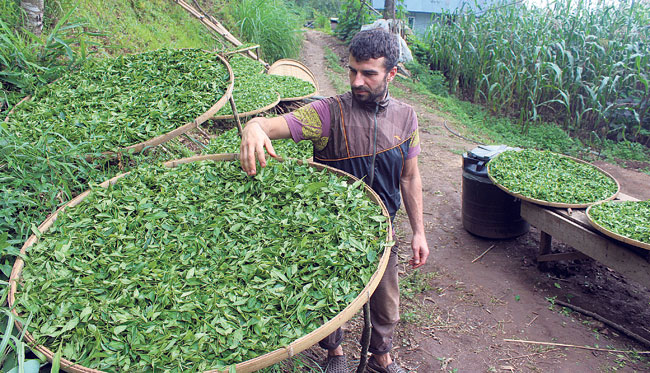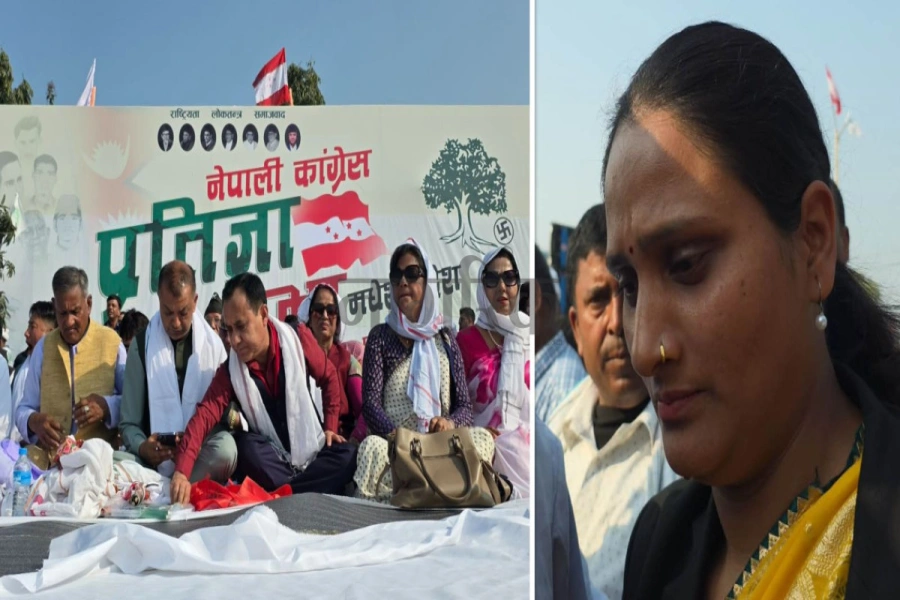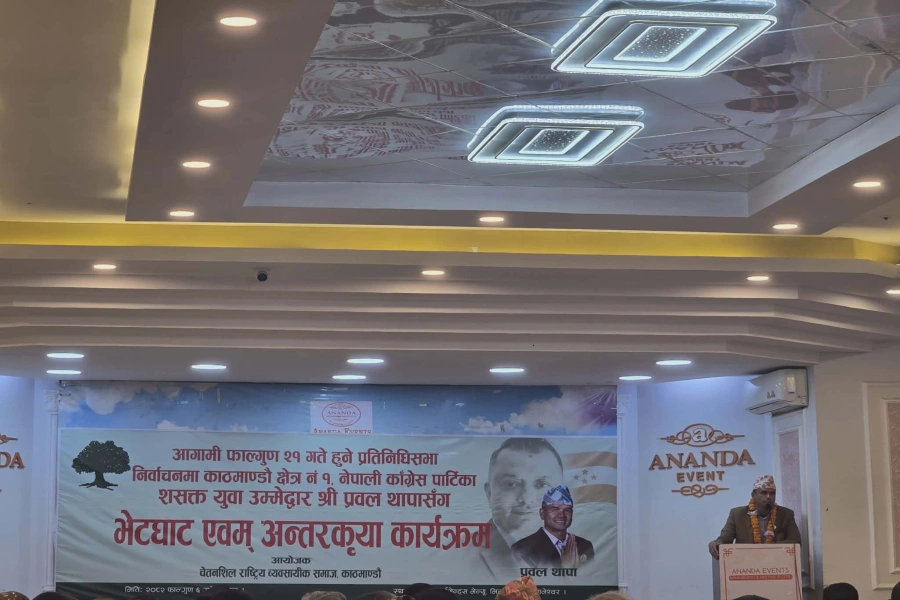ILAM, Aug 30: Of late, Russian tea specialist Alexi Sebekin could be found processing organic tea in Jasbire-based Maipokhari Tea Processing Industry, Ilam district. He also visits tea garden to pick tealeaves, dry it in the sun, process it through machine, and pack the processed tea. And while doing these tasks, more importantly, he has been teaching laborers proper ways for handling tea production and processing tasks.
Alexi has been repeating the routine for the past ten days in Jasbire-based tea industry. The Russian tea specialist has been sharing his expertise on producing quality tea that matches the quality of tea demanded in the international market.
Among his disciples are Man Kumar and Yuwaraj Mukhiya of the tea processing industry. Under Alexi, they have been honing their various skills needed in the tea industry, including tea picking, quality aspects of tealeaves, tea drying, processing and packing techniques.
“We have been learning a lot from him. If we can implement his instructions to the letter, there won't be any problem for us to sell our tea in the international markets,” said tea entrepreneur Man Kumar.
Alexi has been researching on tea produced in Nepal for five years now. He specializes in the research of how tea produced in the country can gain higher demands in the international markets. He believes that being able to adopt the quality of tea that are high in demand in the international tea market can significantly boost the prices of tea produced in Nepal.
Lack of conservation area for rare tea plant

“Organic tea produced in Nepal carries a high potential to spread the country's name in near future. The environment and topography of the country is highly suitable for growing tea,” said Alexi, who has visited most of the tea processing companies in the country.
“However, Nepal should not try to imitate production techniques used by China, India, Taiwan and other countries. It can develop its own unique tea production technique, taking opportunity of the suitable environment,” he added.
He opines that adopting tea processing methods of other countries are killing the country's chance of providing unique tea drinking opportunity to its customers. “Though demand for Nepali tea is already high in the international market, its supply has not been able to meet the demands. Major factors behind it are lack of technology and insufficient skilled human resources in the industry.”
Man Kumar, who seemed very pleased with new lessons on tea production, shared that Nepal can indeed improve its production capacity to meet international demands.
“Alexis especially taught us the production method of Oolong Tea, which has a very high demand in the international market due to its multiple health benefits. Another significant lesson from him is on producing high quality tea from lower quality tealeaves,” he shared.
Prior to Maipokhari Tea Processing Industry, Alexis spent two weeks in Oyam-based Pathivara Tea State of Panchthar district where he shared techniques for producing quality Green Tea, informed Chiranjeevi Dahal, a Kathmandu tea entrepreneur who accompanied Alexis in Panchthar.

[Photos: Bhim Chapagain/Republica
Sebekin drying tealeaves at a Maipokhari Tea Processing Factory.]
Likewise, Teshu Jejing, head of Tea Department at the Zhejiang University of China, had also visited the country a few weeks ago to share expertise on refined tea production method with Nepali tea producers. Jejing's visit focused on sharing expertise for producing tea that is in high demand in the Chinese markets along with tea that are popular in the international tea market. Tea entrepreneurs and producers said adopting Jejing's method in tea production would be highly beneficial if they are able to adopt it.
Similarly, a team of 10 entrepreneurs under Peter Gogli, Vice President of American Tea Association, also visited Gorkha Tea State in Surayadaya Municipality. The team observed tea production and processing techniques at the estate and suggested local entrepreneurs to produce organic tea that is high in demand in the international market.
While stating that Nepal is producing international quality tea, the team stressed that the quality of the tea could be improved further. “I have tasted tea of many places and after tasting tea produced in Nepal, I found that Nepal produces very rich quality tea. Nepali tea carries the potential to offer unique taste to its clients and create its own identity,” Gogli said.
Australia-based National Association for Sustainable Agriculture and International Organization of Marketecology has also been sending their teams in Nepal time and again to inspect consistency of tea quality produced by Nepal. During visits, the team has been providing recommendations to Nepali tea entrepreneurs for improving quality of their tea production.
Visits by tea specialists from various nations have been very much crucial for improving the quality standard of tea produced in Nepal. “Specialists from foreign countries have shared their ideas on improving overall quality of the tea produced in our tea estate. Such ideas have been very crucial in improving the quality of Nepali tea over the years,” Dahal said.
Organic tea produced in eastern hills of the country is sold in markets of China, Germany, USA, and Australia, Denmark, Netherlands along with other countries.





































